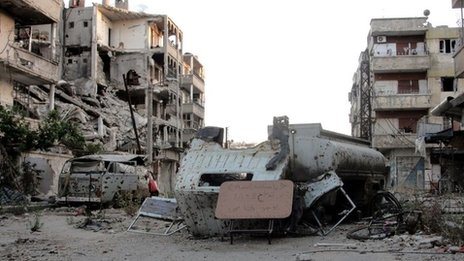Assad forces used chemical weapons - White House
 Syrian forces under President Bashar al-Assad have used chemical weapons "on a small scale" against the opposition rebels, the White House has said.
Syrian forces under President Bashar al-Assad have used chemical weapons "on a small scale" against the opposition rebels, the White House has said.
A senior aide to President Barack Obama said the US estimated 100-150 people had died in "multiple" attacks.
Ben Rhodes said the US president had decided to provide unspecified "military support" to the opposition.
The White House had previously warned that the US considered the use of such weapons to be crossing a "red line".
'High confidence'
Mr Rhodes, a deputy national security adviser to Mr Obama, said the US had no "reliable" evidence the opposition had used chemical weapons.
The White House announcement came the same day the United Nations said the number of those killed in the Syrian conflict had risen to more than 93,000 people.
"The president has been clear that the use of chemical weapons - or the transfer of chemical weapons to terrorist groups - is a red line for the US," Mr Rhodes said.
"Our intelligence community now has a high confidence assessment that chemical weapons have been used on a small scale by the Assad regime in Syria. The president has said that the use of chemical weapons would change his calculus, and it has."
Mr Rhodes said the president had made the decision to increase assistance, including "military support", to the rebels.
But he declined to specify what that would entail, other than to say it would be "different in scope and scale to what we have provided before".
The White House hopes the increased support will bolster the effectiveness and legitimacy of both the political and military arms of Syria's rebels, he said.
He said the aid would benefit the Supreme Military Council (SMC) and Syrian Opposition Coalition, and said the US was "comfortable" working with SMC chief Gen Salim Idris.
"It's been important to work through them while aiming to isolate some of the more extremist elements of the opposition, such as al-Nusra," he said.
The sense of urgency in Washington had been growing as Hezbollah and Iran have increased their own involvement in the conflict, Mr Rhodes said.
'Calculus changed'
The White House announcement immediately shook up the ongoing debate in Washington DC over whether - and how - the US should provide assistance to the rebels.
Republican Senators John McCain and Lindsey Graham, who have been particularly strident in their calls for military aid, said the finding must change US policy in Syria. They called for further action, saying US credibility was on the line.
"A decision to provide lethal assistance, especially ammunition and heavy weapons, to opposition forces in Syria is long overdue, and we hope the president will take this urgently needed step," they said in a joint statement.
"But providing arms alone is not sufficient. The president must rally an international coalition to take military actions to degrade Assad's ability to use airpower and ballistic missiles and to move and resupply his forces around the battlefield by air."
A UN report released on Thursday found at least 5,000 people have been dying in Syria every month since last July, with 30,000 killed since November.
Incomplete death toll
More than 80% of those killed were men, but the UN's Office of the High Commissioner for Human Rights (OHCHR) says it has also documented the deaths of more than 1,700 children under the age of 10.
On Thursday, Mr Rhodes said US intelligence agencies had concluded Mr Assad's forces had used chemical weapons, including the nerve agent sarin, based on battlefield reports, "descriptions of physiological symptoms" from alleged victims, and laboratory analysis of samples obtained from alleged victims.
However, the full number killed by chemical weapons was "likely incomplete", Mr Rhodes said.
Asked whether Mr Obama would back a no-fly zone over Syria, Mr Rhodes said one would not make a "huge difference" on the ground - but would be costly.
He said further actions would be taken "on our own timeline."
